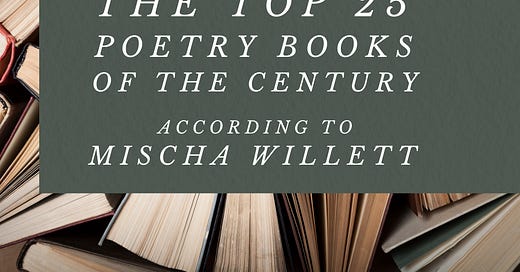For more articles, videos, books, and resources about faith and art, visit RabbitRoom.com.
By Dr. Mischa Willett
I love recommendation lists. There’s something about totting up and taking stock that feels like making order from chaos, an art in itself. Name me the "Best 10 Coffee Shops in London" and there’s a pretty good chance I’ll jump over to check them out. Even when I don’t plan to follow up, I still find them valuable and engaging. I don’t really watch movies, but I look forward to the year-end best-of lists every December. I pore over reviews of theater plays in states I don’t live in. Unlike some, who consider taste so idiosyncratic there’s no point, I find lists, like mix-tapes, a hopeful enterprise, a way of witness: here, this moved me; it may do the same for you.
But I also think one needs to be responsible with best-of lists. Persons new to a genre trust such guides. If the lists lead neophytes astray, they might give up. For example, I have a friend who’s into EDM (electronic dance music). Knowing nothing about it, I asked for a list of representative tracks. I listened. Hearing nothing revelatory there, I’m now closed to the whole game. If someone later asks if I want to go to an EDM show, I’ll just dismiss the notion with a wave of my hand, “No thanks, I tried, it doesn’t do anything for me.”
It matters, is what I’m saying.
This is why many writers I know were upset when The Atlantic released a list earlier this month of the “Most Significant Poetry books of the Century (so far)”. Not because their own books were left off (although there is an Elegy Beta-sized hole right in the middle there, lol), but because the books on that list are, with only a couple of exceptions, on topics with which progressive Atlantic readers ideologically align. What are the odds? And at what point do artworks that consistently and explicitly espouse (or even discuss!) a certain side of political opinion become no longer art, but propaganda? That’s dangerous: many thousands of readers may encounter that list, choose a few to buy, and finding the books more interested in getting readers to vote a certain way than with making something enduring and beautiful, may swear off poetry altogether. That would be a shame because we’re in a renaissance, especially of Christian verse (for an orientation, check out: An Axe for the Frozen Sea.)
Also, I thought we were over this. The poet Samuel Taylor Coleridge warned against overly motivated writing in the 1820s. Immanuel Kant did so even earlier with his concept of “disinterestedness.” A poem book designed to sell a certain brand of dishwasher, for instance, could be a good artwork, but it’s pretty unlikely. As Archibald Macleish wrote, “A poem should not mean, but be.”
Here then is a list, from me to you. These are a poet’s poets. Some of them I admire for technical daring, others for intellectual range. I don’t agree with the politics of some, nor share a worldview with others. Some are by Christians, others are not. But they are all fine, important, dazzling works of poetry as poetry. Warning: this isn’t entry-level stuff. If you don’t already like and read poetry, maybe start somewhere else (I could make you a list!), but if you do, here is honeyed dew, the milk of paradise, and adventure worthy of the name.
(in no particular order)
Jack Gilbert, The Dance Most of All
Mark Strand, Man and Camel
AE Stallings, Hapax
Ben Lerner, Angle of Yaw
Richard Kenney, The One-Strand River
Stephen Dunn, Different Hours
Joshua Mehigan, The Optimist
Jennifer Maier, Dark Alphabet
Dean Young, Solar Perplexus
Terrance Hayes, Lighthead
Don Paterson, Landing Light
Geoffrey Hill, Clavics
Matthew Dickman, All-American Poem
Averill Curdy, Song & Error
Scott Cairns, Anaphora
Heather McHugh, Upgraded to Serious
Louise Gluck, Averno
Andrew Hudgins, American Rendering
Bob Hicok, Elegy Owed
Li-Young Lee, Book of my Nights
Mary Szybist, Incarnadine
W.S. Merwin, Shadow of Sirius
Brenda Shaughnessy, Interior with Sudden Joy
Richard Wilbur, Anterooms
Tony Hoagland, What Narcisism Means to Me
Mischa Willett (Ph.D.) is author of two books of poetry, including The Elegy Beta (2020) and Phases (2017) as well as of essays, translations, and reviews that appear in both popular and academic journals. A specialist in nineteenth-century aesthetics, he teaches English at Seattle Pacific University.





Thank you for this list. I'm new to poetry, or at least to an intentioned attention to poetry now in my 40s. This Substack and the Poetry for All podcast are two of my primary teachers, in addition to some works on my shelf by Wendell Berry, Mary Oliver, Malcolm Guite, Langston Hughes, Michael O'Siadhail, and Shel Silverstein. All that said, I would be grateful for your list of poets/books for us rookies who are late to the game and are still learning the basics. Thank you.
Mischa, I am struck by 1) the names NOT on this list only because you didn't go with the usual--Wendell Berry or Mary Oliver. 2) the names that are.
Scott's is the only small volume I have from your list; I'm intrigued by the Richard Wilbur title. Thank you!